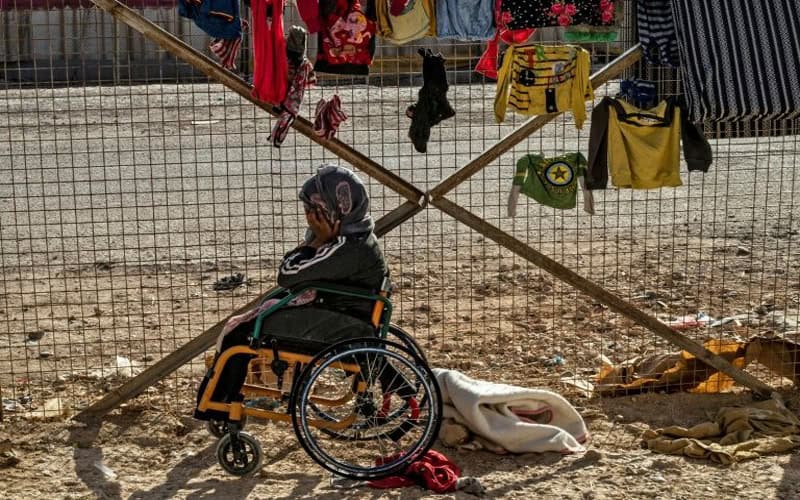Ain Issa: Sitting in a wheelchair beside a metal fence in a camp in northern Syria, nine-year-old Ruqaya Mohammad raises a scarf over her face to hide from journalists.
The Egyptian girl lost her left eye, her legs and both her parents during battles against the Islamic State group in their last Syria redoubt in March.
She now lives in a large tent along with 23 other orphaned children of foreign IS fighters in a camp for the displaced in Ain Issa, under the care of older camp residents.
Aged 18 months to 13-years-old, the children were born to parents from Russia, Uzbekistan, Indonesia, Tajikistan, Egypt and Iraq.
“Among the children, Ruqaya moves me the most,” said Sara al-Abdullah, a 37-year-old who helps look after the orphans.
“She always looks withdrawn, shy, and sad,” said the widowed mother of three, one of nine women residents of the Ain Issa camp paid a small fee to help look after the children.
Outside the tent, tiny children’s tops and trousers have been slung across the metal fence to dry.
Inside, young boys dip flatbread into bowls of soft aubergine stewed in tomatoes.
A volunteer tries to coax a young child into opening his mouth, while another woman feeds an infant with a milk bottle.
A small boy dashes across the tent and throws himself excitedly into a pile of bedding.
– Marred childhood –
The volunteers say some of the children are still visibly scarred after living with their late parents under IS.
“They play at shooting each other or planting mines in the earth,” Abdallah said.
Clutching bits of wood they pretend are guns, she says they throw themselves into imaginary battles, emulating the cries of IS jihadists.
“All that is ingrained in their heads. There’s nothing to help them forget,” said Abdallah.
“They don’t study, or go and play with the little ones. It’s been taken away from them.”
IS overran large parts of Syria and neighbouring Iraq in 2014, declaring a “caliphate” and imposing their brutal interpretation of Islam on millions.
US-backed Syrian fighters in March expelled them from their last patch of territory in the eastern Syrian village of Baghouz.
After years of leading the fight against the jihadists, Syria’s Kurds hold thousands of suspected foreign IS members in detention and camps: men and women, but also some 8,000 children — more than half of whom are under the age of five.
The United Nations says hundreds of them are unaccompanied.
The 24 orphans in Ain Issa were among the tens of thousands of people to stream out of Baghouz in the last weeks of the battle, after months of food shortages and heavy bombardment.
“They were in a pitiful state. They went to hospital and got better,” said Ain Issa camp manager Jalal Iyyaf.
But the camp has received no aid for the orphans and is struggling to provide for them, he told AFP in his office.
“We ask for clothes, food, drink as well as help to rehabilitate them, rid them of IS ideology,” he said.
– Reading and writing? –
Back in the tent, Suad Mohammed Ameen, 20, pulls a T-shirt over a toddler’s head.
The children she helps need food and clothes — but also psychological support, she said.
“The toughest part is when they tell me their fathers and mothers were killed in front of them, or how they lost their siblings,” she said, a fuchsia pink headscarf framing her face.
To help ease the pain, she has vowed to tell the children stories, and even teach the girls to crochet.
“I promised them that, after everything they’d missed out on, I’d help them catch up on reading and writing,” she said.
But Iyyaf, the camp manager, said the best solution would be for their home countries to take them back.
The Kurdish authorities in northeast Syria have repeatedly called for the foreigners they hold to be repatriated, a request that has largely been met with resistance — except in rare cases, including several orphans.
Alaa Suleiman al-Saleh, 19, another one of the caregivers, also hoped the children would be able to go home.
“The situation in this tent is really difficult,” said the young woman, who has been teaching some of the girls to crochet.
“I hope these children will return to their countries so they can catch up on their education and childhood,” she said.

